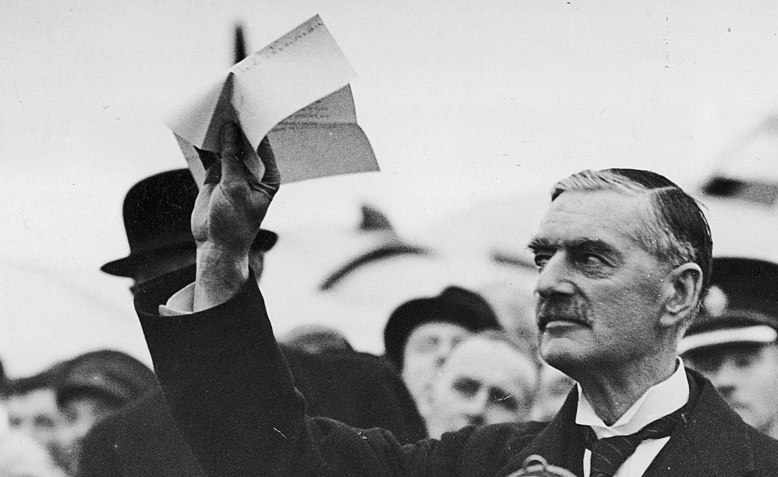 Neville Chamberlain declares Peace in Out time, West London 1939. Photo: Wikimedia
Neville Chamberlain declares Peace in Out time, West London 1939. Photo: Wikimedia
Lindsey German on imperial brinkmanship and the anti-war majority
Here we go again. If there’s one thing more certain than the fact that when Boris Johnson’s lips are moving, he’s lying, it’s that as soon as war involving Britain looms, politicians invoke the spectre of Hitler, Munich, appeasement and the spirit of Dunkirk. Defence minister Ben Wallace has said that there is ‘a whiff of Munich in the air’, and Labour leader Keir Starmer made the same point when attacking the Stop the War Coalition last week.
The constant harking back to the Second World War by British politicians betrays both a nostalgia for lost empire and a fairly fundamental misunderstanding of the conduct of the war itself. It is also a convenient means of comparing later wars with this appalling conflagration which cost 60 million lives worldwide and suggesting that whoever is the latest enemy of Britain is the ‘new Hitler’.
The reality is that Vladimir Putin is no more a new Hitler than was Saddam Hussein. This is not to do with his personal characteristics or otherwise – he has waged war in Chechnya, repressed democratic movements and is a former KGB colonel. His present motives are to do with maintaining Russian power in the region. However the truth is that Russia controls less territory now than it has for several hundred years and it doesn’t have the capacity to be an expansionist power in the way that Hitler’s Germany did.
By contrast Nato, the western military alliance under US control and hegemony, has been the force expanding up to Russia’s borders. The present crisis over Ukraine reflects the fact that this expansion has led to Nato troops being present on Russia’s borders, despite promises given by the US to Russia’s Gorbachev at the end of the Cold War.
The US and Britain especially are talking up the conflict and possible invasion of Ukraine. Russia denies its intentions are invasion but that it wants to highlight the issue of Nato membership and wants assurances Ukraine will not join. We should all oppose war between Russia and Ukraine and back diplomatic measures to prevent it. But we should not ignore the level of hypocrisy involved from our rulers. They are arming Ukraine and talking up war, they want to bring Ukraine closer into the orbit of Nato.
One of the big claims about Nato is that it is a defensive organisation. As I argued in my response to Starmer, far from it. Nato’s bombing of Serbia in 1999 was the first major war in Europe since the Second World War. Its aggressive role in wars in Afghanistan and Libya was in a similar vein and with even more catastrophic results. Its expansion to operate in the Indo Pacific region is further evidence of the militaristic and warmongering nature of the Cold War organisation.
The misconception about war promoted by Starmer in his article argues that strength through militarism is the best way to preserve peace. This has been the justification of warmongers and supporters of nuclear weapons time after time. It cannot explain why wars happen at the points of great military build-up and that the drive to militarisation is part of the drive to war not an antidote to it. It ignores why and how wars happen and the whole system of imperialism which foster them. In times of crisis, the increased economic competition between states also leads to military competition and the build-up to war. We see this with the present crisis but also more seriously the growing new cold war between the US and China. And if the west thought it could separate the question of Russia from China, it has actually pushed them closer together over Ukraine, as the joint statement issued last week demonstrates.
A war in Ukraine is not in the interests of working people either there or in Russia or here in Britain. When we are facing a cost of living crisis, it is obscene that Johnson has already spent many millions on military aid, weaponry and troop deployment. He is not in a strong position politically on this. A recent poll showed, when asked what actions Britain should take should if Russia invades Ukraine,
‘Britons are most in favour of diplomatic and economic sanctions (40%) while around a third (36%) support humanitarian interventions, such as supporting any Ukrainian refugees. Less than 1 in 5 (17%) would be in favour of military intervention while 21% say Britain should not intervene at all.’
Yet again, despite the media hype and the bipartisan approach to foreign policy, millions of people in Britain can see through this and do not want war. It is to Labour’s shame that it is once again promoting war rather than alternatives to war. Its determination to match Johnson’s jingoism will cost it dear. And it gives the Tories cover for their war against the working class at home. We have to oppose these wars on both fronts.
Before you go
Counterfire is growing faster than ever before
We need to raise £20,000 as we are having to expand operations. We are moving to a bigger, better central office, upping our print run and distribution, buying a new printer, new computers and employing more staff.

